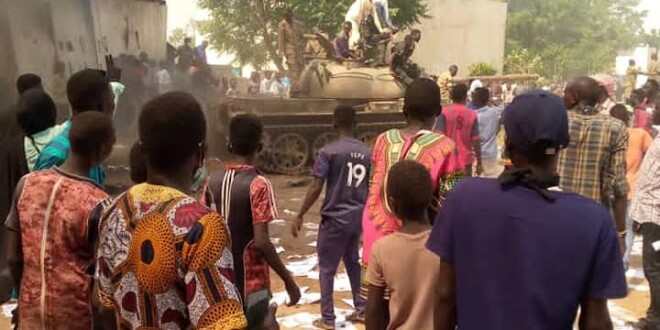( 5 September 2021) The African Centre for Justice and Peace Studies (ACJPS) calls on the Sudanese authorities to urgently investigate the killing of one student and injury of 16 others that occurred on 31 August 2021 in Zalingi city, Central Darfur State. The transitional government should urgently set up an independent and impartial commission to ensure an immediate and effective investigation into the full scale of the killing and injury, identify those responsible, and recommend ways to hold them accountable.
In the morning of Tuesday, 31 August, students of Zalingei University held a peaceful protests in front of the former UNAMID headquarters against the reported failure by government authorities to hand over the building to the university as promised earlier. Protesters gathered on the streets where they burnt vehicle tyres and later marched towards the government headquarter. Sudanese joint security forces responded by firing live ammunition and tear gas at the protesters.
The excessive use of force the by security forces resulted in the death of Mr Ezzeldin Omar Musa, a 24-year-old student of the Faculty of Science of Technology, and injury of 16 other students. Reliable information indicates that three students are in critical health condition and have been transferred to Nyala Teaching Hospital in Nyala, South Darfur.
The Ministry of Higher Education and Scientific Research released a statement on 1 September, saying it “condemns the use of excessive violence and the shooting of unarmed students and calls for the speedy bringing of the perpetrators to justice”.
The violent response from the security forces towards the student protesters raises concerns about the continued reliance on repressive tactics to disrupt peaceful assembly. ACJPS calls on the Government of Sudan to respect the peoples’ rights to freedom of assembly, association and expression as guaranteed in international standards and UN treaties ratified by Sudan and refrain from using excessive force to disperse protests.
The policing of assemblies must respect human rights and must be carried out in accordance with international standards, which prohibit the use of force unless strictly necessary and proportionate. Sudanese authorities should ensure that police and other security services responsible for policing demonstrations or performing other law enforcement duties comply with international standards on the use of force. It should be made clear that arbitrary or abusive use of force by security forces will be punished as a criminal offence.
ACJPS reiterates its calls to the Transitional Government to:
- Respect and ensure the right to peacefully assemble,
- Investigate the abusive use of force including the killings and injuring of protests with an aim to identify and hold perpetrators accountable,
- Ensure access to free treatment and rehabilitation to individuals injured through the violent dispersal by the authorities,
- Refrain from deploying armed forces and government-sponsored militias including Rapid Support Forces to disperse peaceful gatherings,
- Ensure police and other security services policing demonstrations or performing other law enforcement duties receive adequate training and caution on the use of force in line with UN Code of Conduct for Law Enforcement Officials and the UN Basic Principles on the Use of Force and Firearms by Law Enforcement Officials.
Background
Although Articles 56 and 57 of the Constitutional Charter guarantees the freedom of expression and assembly respectively, Sudanese authorities have progressively and deliberately continued violating these rights using force including firing of live ammunition to disperse peaceful protests. In July 2020, ACJPS documented the killing of 12 peaceful protesters and injury of 14 others in Fata Borno, North Darfur state. Three peaceful protesters were killed in El-Obeid in August 2019 whilst in Khartoum, ACJPS documented the killing of two peaceful protesters and injury of 37 others on 11 May 2021.
A lack of accountability for these crimes has fostered a climate of impunity in Sudan .To date, several perpetrators of human rights violations have not been held accountable mainly due to the immunity laws that protect perpetrators and a lack of political will. The National Security Act was amended in July 2020 to remove immunity granted to members of National Intelligence Security Services, now rebranded as the General Intelligence Services. However, there is still need to amend laws that protect the police, army and other security agencies from prosecution of human rights abuses.
 African Centre for Justice and Peace Studies ACJPS | المركز الافريقي لدراسات العدالة و السلام
African Centre for Justice and Peace Studies ACJPS | المركز الافريقي لدراسات العدالة و السلام




